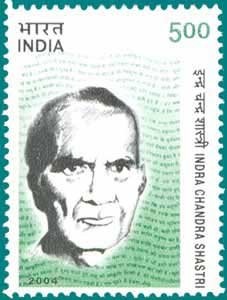92nd Birth Anniversary of Indra Chandra Shastri (1912-1986)

Technical Data
| Date of Issue | May 27, 2004 |
|---|---|
| Denomination | Rs. 5 |
| Quantity | 400,000 |
| Perforation | comb 13 x 13½ |
| Printer | Security Printing Press, Nashik |
| Watermark | No Watermark |
| Colors | Multicolor |
| Catalog Codes |
Michel IN 2025 Stamp Number IN 2061 Yvert et Tellier IN 1790 Stanley Gibbons IN 2203 WADP Numbering System - WNS IN011.04 |
| Themes | Famous people | Men | Philosophers |
Table of Contents
Dr. Indra Chandra Shastri: A Beacon of Indian Intellect and Spirituality
In the realm of Indian scholarship, Dr. Indra Chandra Shastri shines as a gentle yet profound luminary, illuminating the vast landscape of knowledge with a steady flame of intellect. Aptly described by Jainendra Kumar as a living symbol of Indian intellect, Dr. Shastri was a multifaceted philosopher, author, and authority on a plethora of subjects including poetics, philosophy, religion, culture, Indology, linguistics, and epistemology. His pioneering contributions spanned diverse fields such as Pali, Prakrit, Eastern and Western philosophy, and the history of India.
Early Life and Academic Pursuits
Born on May 27, 1912, in Dabwali Mandi, now in Haryana’s Sirsa district, Dr. Shastri’s academic journey began in Bikaner, where he delved into the study of Sanskrit and Prakrit. He later earned a Master’s degree in Sanskrit from Agra University and was awarded the title of Shastracharya in Vedanta from the Banaras Hindu University. His further academic achievements included a Shastri from Punjab University and Nyayatirtha from Calcutta, culminating in a Ph.D. under Pandit Bat Krishna Mishra. His doctoral dissertation, focusing on the Epistemology of Jain Agamas, was highly praised for its depth and insight.
Advocacy and Activism
Deeply influenced by Mahatma Gandhi, Dr. Shastri actively participated in India’s freedom movement. In 1942, he campaigned against Bat Diksha, a practice involving the forcible adoption of poor children by Jain ascetics in Rajasthan, leading to the introduction of a bill in the Bikaner assembly. He also organized relief efforts during the traumatic events of the partition.
Academic Leadership and Contributions
Dr. Shastri’s contributions to academia were significant. From 1954 to 1958, he served as the Secretary of the Akhil Bharatiya Sanskrit Sahitya Sammelan and organized the Delhi session of the All India Oriental Conference in 1957. In 1959, he became the first Head of the Department of Sanskrit at the University of Delhi, a position he held until he resigned in 1961 due to glaucoma-related vision loss. Despite this setback, he continued his research as a Professor Emeritus and engaged in guest lectures across various departments.
His literary output is remarkable, comprising around 70 books and over 600 research papers that bridged ancient wisdom with contemporary thought. His notable works include Sanskrit Kavya Shastra Ka Itihas, Mahabharat Ke Sukti Ratna, and Jainism and Democracy. In Pali Bhasa Aur Sahitya, he offered a profound analysis of historical thought currents, advocating for reason and logic to dismantle outdated ideologies.
Recognition and Legacy
Dr. Shastri’s scholarly achievements were recognized with several accolades, including the Sahitya Seva Samman by the Hindi Academy and the Sahitya Ratna Alankaran from the Vice Chancellor of Delhi University. He received a Certificate of Honour from the President of India on August 15, 1986.
His work, particularly in Epistemology of Jain Agamas, garnered respect for its balanced and mature analysis of differing philosophical positions, establishing him as a leading exponent of Jainology in English. Even after losing his sight, he continued to dictate his thoughts, demonstrating an indomitable spirit of dedication to knowledge and truth.
A Spiritual Journey
Dr. Indra Chandra Shastri’s life was a testament to the quest for truth and spiritual understanding. He advocated for a journey from the personal to the universal, urging individuals to seek spiritual upliftment while engaging with the world. He passed away on November 3, 1986, leaving behind a legacy of courage, intellect, and a deep commitment to the pursuit of knowledge.
In honor of his remarkable contributions to Indian intellect and spirituality, the Department of Posts has issued a commemorative postage stamp in memory of Dr. Indra Chandra Shastri, celebrating a life dedicated to enlightenment and social betterment. His journey continues to inspire countless individuals in their quest for truth and understanding.
